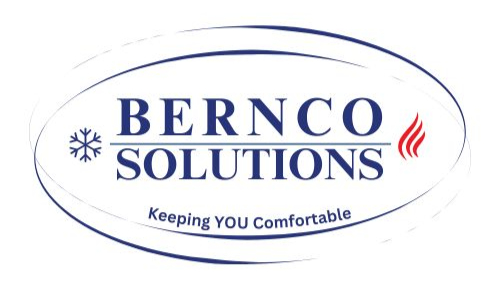Energy-Efficient HVAC Solutions for Your Home
- Bernco Solutions

- Nov 4, 2025
- 4 min read
When it comes to keeping your home comfortable throughout the year, your HVAC system plays a huge role. But did you know that choosing the right system can also help you save money and reduce your environmental impact? I want to share some practical tips and insights about eco-friendly HVAC systems that can make a real difference in your home. Whether you’re thinking about upgrading your current setup or just want to learn how to use your system more efficiently, this guide will help you understand your options and make smart choices.
Why Choose Eco-Friendly HVAC Systems?
Eco-friendly HVAC systems are designed to use less energy while still keeping your home warm in the winter and cool in the summer. This means you get the comfort you want without wasting energy or spending too much on your utility bills. These systems often use advanced technology and environmentally safe refrigerants that reduce harmful emissions.
One of the biggest benefits of eco-friendly HVAC systems is that they help protect the environment. By using less energy, you reduce your carbon footprint. This is especially important in areas like Travelers Rest, Greenville, and Spartanburg, where many homes and businesses rely on heating and cooling year-round.
Here are some key advantages of eco-friendly HVAC systems:
Lower energy bills: Using less energy means you pay less each month.
Better air quality: Many systems include filters that improve indoor air.
Longer lifespan: High-quality, efficient systems often last longer.
Reduced environmental impact: Less energy use means fewer greenhouse gases.

How to Identify Energy-Efficient HVAC Solutions
When shopping for a new HVAC system or upgrading your current one, it’s important to look for features that make it energy-efficient. Here are some things to keep in mind:
Energy Star Certification: This label means the system meets strict energy efficiency guidelines set by the U.S. Environmental Protection Agency.
SEER Rating: The Seasonal Energy Efficiency Ratio measures cooling efficiency. The higher the SEER, the more efficient the system.
AFUE Rating: The Annual Fuel Utilization Efficiency rating applies to furnaces and shows how well fuel is converted to heat.
Variable Speed Technology: Systems with this feature adjust their output to match your home’s needs, saving energy.
Smart Thermostats: These devices learn your schedule and adjust temperatures automatically to save energy.
If you want to explore professional options, you can check out energy-efficient hvac solutions that offer tailored services for your home or business.
Tips for Maintaining Your Eco-Friendly HVAC System
Even the best eco-friendly HVAC system needs regular care to keep running efficiently. Here are some simple maintenance tips you can follow:
Change Filters Regularly: Dirty filters reduce airflow and make your system work harder.
Schedule Annual Tune-Ups: A professional can check for issues and clean components.
Keep Vents Clear: Make sure furniture or curtains don’t block air vents.
Seal Leaks: Check windows and doors for drafts and seal them to keep air inside.
Use a Programmable Thermostat: Set it to lower heating or cooling when you’re not home.
By following these steps, you can extend the life of your system and keep your energy bills low.
Choosing the Right System for Your Home
Selecting the right HVAC system depends on several factors, including the size of your home, your budget, and your comfort preferences. Here are some common types of eco-friendly HVAC systems to consider:
Heat Pumps: These systems provide both heating and cooling by moving heat in or out of your home. They are very efficient and work well in moderate climates.
Geothermal Systems: These use the earth’s stable underground temperature to heat and cool your home. They have higher upfront costs but offer great savings over time.
Ductless Mini-Splits: Ideal for homes without ductwork, these systems allow you to control temperatures in individual rooms.
High-Efficiency Furnaces and Air Conditioners: These models use advanced technology to reduce energy use while maintaining comfort.
It’s a good idea to consult with a trusted HVAC professional who understands local climate conditions and can recommend the best system for your needs.
Making Your Home More Energy-Efficient Beyond HVAC
While upgrading your HVAC system is a big step, there are other ways to improve your home’s energy efficiency. Here are some ideas that work well alongside eco-friendly HVAC systems:
Improve Insulation: Proper insulation keeps warm or cool air inside your home.
Install Energy-Efficient Windows: Double-pane or low-E glass windows reduce heat transfer.
Use Ceiling Fans: Fans help circulate air and reduce the need for heating or cooling.
Seal Air Leaks: Use weatherstripping and caulk to close gaps around doors and windows.
Use Energy-Efficient Lighting: Switch to LED bulbs to reduce electricity use.
Combining these improvements with an efficient HVAC system can lead to significant savings and a more comfortable home.
Your Partner for Reliable HVAC Services
If you’re ready to explore eco-friendly HVAC systems or need help maintaining your current setup, working with a local expert is the best choice. A trusted provider understands the unique needs of homes and businesses in the Travelers Rest, Greenville, and Spartanburg areas. They can offer reliable repairs, installations, and maintenance plans that keep your system running smoothly year-round.
Choosing the right partner means you get peace of mind knowing your comfort is in good hands. Plus, professional service ensures your system operates at peak efficiency, saving you money and energy.
I hope this guide helps you feel confident about making your home more comfortable and energy-efficient. Remember, investing in eco-friendly HVAC systems is not just good for your wallet but also for the planet. If you want to learn more about energy-efficient hvac solutions, don’t hesitate to reach out to a local expert who can guide you every step of the way.


Comments